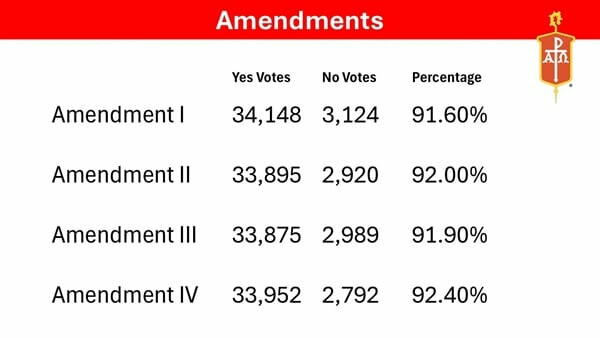Ratified Constitutional Amendments

What was ratified?
At General Conference 2024, delegates approved constitutional amendments that were ratified by a majority of annual conference voters across the connection. The Council of Bishops announced the results on November 5, 2025.
These amendments address Worldwide Regionalization, Inclusivity (Article IV, paragraph 4), Combating Racism (Article V), and Voting Eligibility (¶ 35).
Download a 1-page summary FAQ: United Methodist constitutional amendments
Amendment 1: Worldwide Regionalization
The most discussed and far-reaching of the measures voted on is worldwide regionalization — a package of legislation that gives The United Methodist Church’s geographic regions equal decision-making authority.
Under regionalization, the U.S. and each of the central conferences (church regions in Africa, Europe, and the Philippines) will become regional conferences with the same authority to adapt parts of the Book of Discipline, the denomination’s policy book, for greater missional effectiveness. Just as has been the case in the U.S. and each central conference, each regional conference will consist of multiple annual conferences.
Previously, only central conferences had authority under the denomination’s constitution to adapt the Discipline as missional needs and different legal contexts require. This constitutional amendment not only extends that same authority to the U.S. but also spells out what can be adapted.
Among other things, each regional conference will now be able to:
- Publish its own hymnal, book of worship and regional Book of Discipline.
- Set requirements for ordination and licensed ministry of pastors.
- Set standards for lay membership.
- Develop practices around marriage ceremonies, funerals and other rites in line with understanding of Scripture and the laws of each country.
- Work with annual conferences to ensure policies and practices align with the laws of each country.
The regionalization amendment changes to more than 20 paragraphs in the denomination’s constitution.
What regionalization means in the US What regionalization means outside the US
Amendment 2: Inclusivity
This amendment adds the words “gender” and “ability” to the list of characteristics that do not bar people from membership in a United Methodist church. In short, this constitutional amendment means that pastors may not deny a person church membership, worship participation, or access to programs, regardless of the person's gender or disability.
Specifically, the amended Paragraph 4, Article IV in the constitution will say: “All persons, without regard to race, gender, ability, color, national origin, status, or economic condition, shall be eligible to attend its worship services, participate in its programs, receive the sacraments, upon baptism be admitted as baptized members, and upon taking vows declaring the Christian faith, become professing members in any local church in the connection.”
The General Commission on the Status and Role of Women (COSROW) offers a video on amending Para. 4, Article IV.
Amendment 3: Combating Racism
The revision of the constitution’s Paragraph 5, Article V, statement on racism will change to name specific forms, including colonialism, white privilege, and white supremacy. This ratified amendment means that in addition to acknowledging past racism, every United Methodist is called to actively confront racism in all its forms and contexts.
As amended, the article will read: “The United Methodist Church proclaims that from God’s goodness and love, God created all persons as God’s unique and beloved children. Racism opposes God’s law, goodness and love and diminishes the image of God in each person. Fueled by white privilege, white supremacy and colonialism, the sin of racism has been a destructive scourge on global society and throughout the history of The United Methodist Church. It continues to destroy our communities, harm persons, obstruct unity and undermine God’s work in this world. Racism must be eradicated. Therefore, The United Methodist Church commits to confronting and eliminating all forms of racism, racial inequity, colonialism, white privilege and white supremacy, in every facet of its life and in society at large.”
The United Methodist Commission on Religion and Race submitted the amendment and offered a video for clarity from the General Secretary, the Rev. Giovanni Arroyo.
Amendment 4: Clergy Voting Eligibility
The ratified amendment to Paragraph 35, Article IV clarifies who can elect the clergy delegates who serve at General Conference, and also at U.S. jurisdictional and central conferences, which elect bishops.
Annual conferences elect the delegates who vote at all of these gatherings. Half of those elected are lay and half clergy, with the constitution requiring lay people to elect lay delegates and clergy to elect clergy delegates.
The amendment, submitted by the United Methodist Board of Higher Education and Ministry, specifies that clergy voters must hold an M.Div. from a University Senate–approved seminary or an equivalent approved by their regional conference. Licensed local pastors remain eligible once they complete the Course of Study or M.Div., just as before. This brings consistency to clergy voting standards worldwide.
